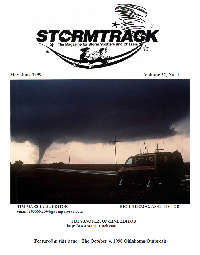Storm Track (magazine)

Sample of the May–June 1999 cover
|
|
| Editor | Timothy P. Marshall |
|---|---|
| Former editors | David K. Hoadley |
| Categories | Science, hobby |
| Frequency | Bimonthly |
| Publisher | Tim Marshall (1986-2002) David Hoadley (1977-1986) |
| Founder | David Hoadley |
| Year founded | 1977 |
| Final issue Number |
2002 Vol 25 No 1 |
| Country | United States |
| Language | English |
| Website | stormtrack |
| OCLC number | 9331024 |
Storm Track was the first magazine for and about storm chasing. The magazine was in circulation between 1977 and 2002.
Storm Track was started in 1977 by chasing pioneer David Hoadley following an informal meeting of storm chasers at an American Meteorological Society conference. In the beginning, it was published in newsletter format but in time assumed a magazine format and was published bimonthly throughout its history. In 1986, editorship was handed over to Tim Marshall, a storm damage engineer (and meteorologist). Production of paper issues ceased in 2002 after a 25-year run; however, an accompanying website started in 1996 and continues primarily in the form of a large discussion board.
Storm Track, among other topics, published storm chase accounts, discussions of issues affecting storm chasing, history of storm chasing and meteorology, meteorological analysis and case studies, climatology, reviews, biographies, photography, cartoons, poetry, and classifieds.
Storm Track was a non-profit publication aimed at scientists and amateurs interested in severe storms. Rich Herzog was an associate editor since 1991 and Phil Sherman an assistant editor from 1986-1990. Another associate editor and a founding member was Randy Zipser. Gene Rhoden contributed significantly to the cover design in 1986. It was published with Master Graphics in Dallas, Texas. Tim Vasquez was online editor. Most articles and photographs were submitted by subscribers. More than 180 people wrote articles for the magazine. David Hoadley made all the drawings and sketches and did many of the cartoons which were known as "Funnel Funnies". It began with 10 subscribers in 1977 and grew to several hundred over the years. Circulation peaked at nearly 1,000 in mid-1996 in association with the release of Twister.
...
Wikipedia
